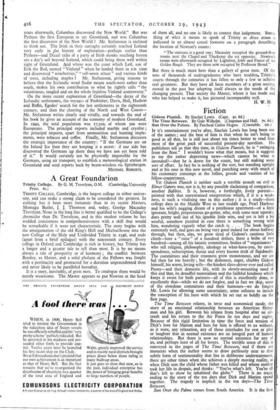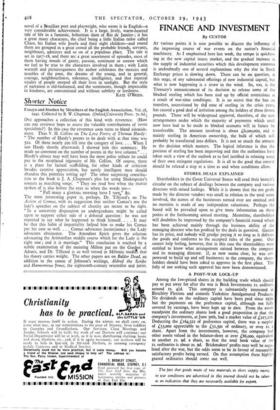Fiction
Gideon. Pianists. By Sinclair Lewis. (Cape. 9s. 6d.) The Time Between. By Gale Wilhelm. (Chapman and Hall. 7s. 6d.) Sun Over the Palms. By Paschoal Carlos Magno. (Constable. IOS.) IF it's entertainment you're after, Sinclair Lewis has long been one of the names ' • and the best of is that when he isn't being so good as all that, he is still just about ten times better to read than most of the great pack of successful present-day novelists. His publishers tell us that this time, in Gideon Planish, he is " swinging from the floor." I wouldn't know what that means, but it suggests to me the rather depressing news—which cannot be what is intended?—that he is down for the count, but still making some sort of effort. In fact he is nothing of the sort, but standing upright and at his ease in this new novel, and punching away with much of his customary contempt at the follies, greeds and vanities of his fellow-countrymen. Yet Gideon Planish is neither such a terrible assault on evil as Elmer Gantry was, nor is it, by any possible slackening of comparison, another Babbitt. It is, however, a forthright, lively portrait— painted with that unrestrained exasperation which, if it is a weak- ness, is such a vitalising one in this author; is a study—from college days in the Middle West to late middle age, Pearl Harbour and his wife's nagging dream of a penthouse apartment—of a little ignorant, bright, preposterous go-getter, who, with some near squeaks, does pretty well out of his ignoble little wits, and yet is left a bit wistful, somehow puzzled in case there is something wrong with him, wondering vaguely what the catch is. . . . The book begins extremely well, and goes on being very good indeed for about halfway through, but then, alas, we grow tired of Gideon's cautious little climb—here a " raise " of a hundred dollars, there a bribe of two hundred—among all his lunatic committees, bodies of " organisators " who sell religion, philosophy, ideology or what-have-you' by corre- spondence, subscription, threat and every known trick of flapdoodle. The committees and their crassness grow monotonous, and we are fed then far too heavily ; but the dishonest, eager, chubby Gideon himself, his warm, loving wife—the kindest slave-driver ever and called Peony—and their domestic life, with its slowly-mounting need of this and that, its dreadful materialism and the faithful kindness which keeps it sweet for both partners all of- this is excellently done, so excellently that—while we do not forgive, and in fact we skip, some of the overdone committees and their humours—we do forgive Mr. Lewis for allowing some uncertainty, some softness to invade the conception of his, hero with which he set out so boldly on the first page.
The Time Between relates, in terse and economical mode, the story of an emotional relationship between an American flying- man and his girl. Between his release from hospital after an air- crash and his return to the Air Force lie ten days and nights. Because of this rigid limitation in time the force and tension of Dick's love for Marion and hers for him is 'offered to us without, as it were, any relaxation, any of those interludes for rest or play or laughter that in normal existence are an integral part of human relationships. But there is now no normal existence for any of us, and perhaps least of all for lovers. The terrible sense of this is conveyed in the pages of The Time Between, and if there are moments when the author seems to draw perilously near to that subtle form of sentimentality that lies in deliberate understatement, there are other times when she achieves a deeply moving reality, as
when Dick sees the child whose father was killed and whose mother
took her life in despair, and thinks : " You're what's left. You're all that's left to show he inhabited the globe." There is no tragic ending to the story of the ten days that Dick and Marion spend together. The tragedy is implicit in the ten days—The Time Between.
Sun Over the Palms comes from South America. It is the first
novel of a Brazilian poet and playwright, who wrote it in English—a very considerable achievement. It is a large, lively, warm-hearted tale of life in a fantastic, bohemian slum of Rio de Janeiro ; it has a great many characters, the chief being a little Italian tailor called Chico, his Italian wife Josefa and their eight children—and round them are grouped, in a great crowd all the probable friends, servants, neighbours, admirers and so on of a populous place. The tale is set in 1917-18, and there are a great assortment of episodes, most of them having moods of gaiety, passion, sentiment or sorrow which we feel to be true to the characters involved in them ; with Latin warmth and picturesqueness the author celebrates the mercies and troubles of the poor, the dreams of the young, and in general, courage, neighbourliness, tolerance, intelligence, and that especial vitality of people steeped all their lives in sunlight. But the style of narration is old-fashioned, and the sentiments, though impeccable in kindness, are conventional and without subtlety or freshness.
KATE O'BRIEN.



























 Previous page
Previous page